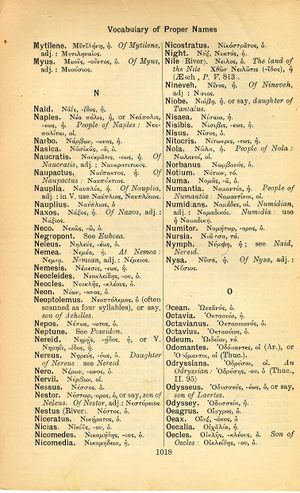Naxos
καὶ τὸ σιγᾶν πολλάκις ἐστὶ σοφώτατον ἀνθρώπῳ νοῆσαι → and silence is often the wisest thing for a man to heed, and often is man's best wisdom to be silent, and often keeping silent is the wisest thing for a man to heed
English > Greek (Woodhouse)
Νάξος, ἡ.
Of Naxos, adj.: Νάξιος.
Latin > English (Lewis & Short)
Naxos: i, f., = Νάξος,
I the isle of Naxos (now Naxia, or Axia), in the Ægean Sea, the largest of the Cyclades, famed for its wines, and for the abandonment there of Ariadne by Theseus, Plin. 4, 12, 22, § 67; Verg. A. 3, 125; Ov. M. 3, 640; Prop. 3, 17 (4, 16), 27.— Hence, Naxĭus, a, um, adj., Naxian: turba, Prop. 3, 17 (4, 16), 28: juncus, Plin. 21, 18, 69, § 115: ardor, Ariadne's crown, a constellation, Col. 10, 52: cos, = Ναξία ἀκόνη, a whetstone from Naxos, Plin. 36, 22, 47, § 164. —Subst.: naxĭum, ii, n., a Naxian whetstone, Plin. 36, 7, 10, § 54; 37, 8, 32, § 109.—
II An ancient city of Sicily, destroyed by Dionysius. On or near its site Tauromenium was built, Plin. 3, 8, 14, § 88.
Latin > French (Gaffiot 2016)
Naxos ou Naxus, ī, f. (Νάξος), Naxos [île de la mer Égée, la plus grande des Cyclades : Virg. En. 3, 125 || ville située dans l’île : Plin. 4, 67 || ville de Sicile : Plin. 3, 88 ; Prop. 3, 17, 27 || -xĭus, a, um, de Naxos : Plin. 21, 115 ; Naxius ardor Col. Rust. 10, 52, la Couronne d’Ariane [constellation, auj. la Couronne boréale] || Naxia cōs, f. Plin. 36, 164 et Naxĭum, ĭī, n., Plin. 36, 54 ; 37, 109, pierre de Naxos servant à polir le marbre.

